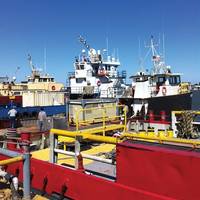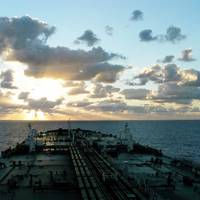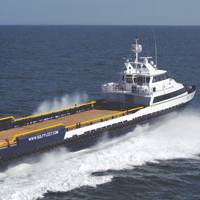Nine Rescued from Yacht Fire near Shetland
A skipper and his crew have been rescued from a life raft after their yacht - The Miracle - caught fire off the coast of Shetland, Scotland. According to a BBC report, nine people have been rescued after a yacht caught fire off Shetland. Coastguards were alerted to the incident, about 50 miles south west of Shetland, at about 09:20. Dramatic video footage, filmed from a coastguard helicopter, showed the blaze taking hold on board the stricken boat. But appropriately, given the name of their ship, the sailors miraculously emerged unscathed from the inferno. All nine on board the unnamed yacht had abandoned the vessel and were picked up from their liferaft by an oil support vessel. It was then heading to Scalloway Harbour. The British Red Cross said it was on hand to help the crew.
Offshore O&G: Weathering the Storm

Vessels are stacked as Gulf oil operators retrench and day rates fall. In the Gulf of Mexico, vessels serving offshore oil-and-gas exploration and production are being stacked or idled as the rig count there declines. Oil companies are retrenching while crude prices remain weak, with smaller operators and the shallow-water sector scaling back the most. As the situation unfolds, MarineNews asked David Barousse, general manager at Fleet Operators, Inc., a marine transportation firm in Morgan City, La., for his take on today’s predicament and what the future holds.
Oil Tankers Run Gauntlet in Nigeria's 'Pirate Alley'

A pirate attack that killed a supertanker crewman off the coast of Nigeria this week has highlighted a growing threat off oil-rich West Africa, as vessels carrying millions of barrels of crude traverse a region that has become known as "pirate alley". The 2 million barrel Kalamos Very Large Crude Carrier (VLCC) was heading to Nigeria's main oil terminal when it was attacked late on Monday, leaving the ship's Greek deputy captain dead and three crew members taken hostage. Security experts say the waters off Nigeria are now the deadliest on earth…
WESMAR Bow Thruster on Oil Support Vessel

WESMAR (Western Marine Electronics) of Woodinville, Wa. has announced the installation of their ABS design approved bow thruster for dynamic positioning on the 175 ft FSV Gulf Fury, the newest and fastest oil support vessel for Gulf Fleet of Lafayette, Louisiana. Gulf Fury, joins a fleet of 17 other Gulf Fleet vessels. “She is our first total ABS classed DPS-1 vessel. With this classification and with WESMAR’s V2-20 ABS design approved bow thruster, the Gulf Fury is viewed highly in the industry…
Feature: New Maritime Security Rules: Will Your Company be Ready?
A new series of seminars, starting in July and ending in September, aims to educate the maritime community on fast developing new rules and regulations, and more importantly, on how these changes will affect individual companies. Starting in July and ending in September, The Havnen Group — in conjunction with The Maritime Group, publishers of Maritime Reporter & Engineering News, MarineNews and the Marine Security Sourcebook — will host a nine-seminar series, starting in the Gulf of Mexico and ending in New York. Since 9/11, the U.S. has been exerting increased security upon all means of transportation. The international maritime community perceives increased security as a necessity to continuing commerce.
Seminar Series Aims to Ensure Compliance
A new series of seminars, starting in July and ending in September, aims to educate the maritime community on fast developing new rules and regulations, and more importantly, on how these changes will affect individual companies. Starting in July and ending in September, The Havnen Group — in conjunction with The Maritime Group, publishers of Maritime Reporter & Engineering News, MarineNews and the Marine Security Sourcebook — will host a nine-seminar series, starting in the Gulf of Mexico and ending in New York. Since 9/11, the U.S. has been exerting increased security upon all means of transportation. The international maritime community perceives increased security as a necessity to continuing commerce.












